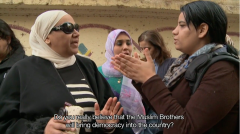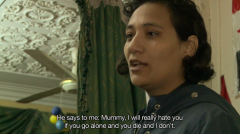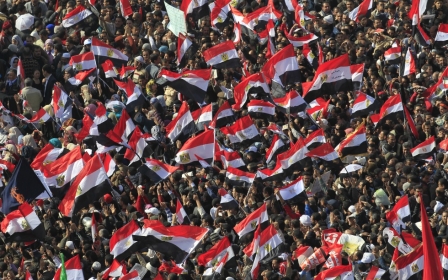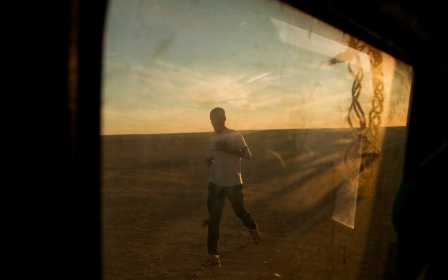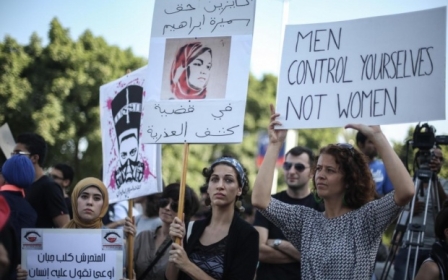FILM REVIEW: Private Revolutions - Young, Female, Egyptian
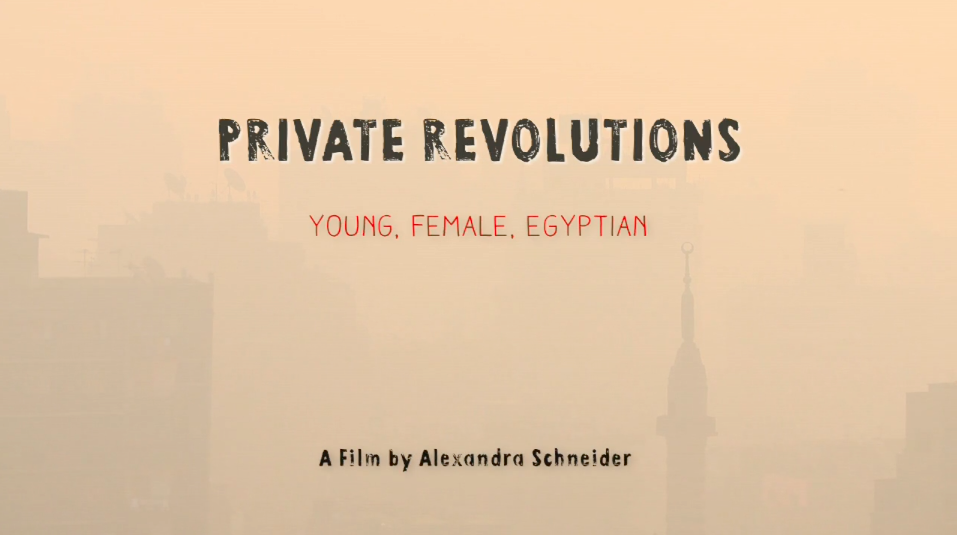
Austrian filmmaker Alexandra Schneider watched Egypt’s revolution unravel on TV where male journalists reported live from Tahrir Square, interviewed male leaders and male commentators analyzed the situation.
But where were Egypt’s women in this watershed?
Schneider set out to show just that with her documentary “Private Revolutions - Young, Female, Egyptian,” which screened its world premiere this week at the 20th Sarajevo Film Festival.
During the Arab Spring, Schneider heard stories of many brave women who were participating actively in the revolution such as Asmaa Mahfouz, who filmed a vlog calling all Egyptians to join her to protest at Tahrir Square, which went viral on Youtube and helped spark the revolution.
“I found it impressive how they spoke out and I was wondering why we don’t hear more about them,” Schneider explained at the documentary forum in Sarajevo.
“In a society like this, how come the women are much stronger than I imagined? I wanted to understand it more.”
Private Revolutions offers us a window into the lives of four young women from different social backgrounds as they fight for their beliefs after the revolution.
We meet Amani Eltunsi, who was just 25 years old when she started her own radio station for women where they talk about domestic violence, sexual discrimination, personal freedom - no topic is off limits. She also established her own publishing house, where she publishes books
about women’s issues such as divorce - a topic that would have been unimaginable to speak openly about 15 years ago.Schneider’s camera follows the young women closely, building a strong and familiar rapport between the four protagonists and viewers. Schneider never fails to capture intimate and emotional moments such as when Eltunsi, while driving her car, is visibly upset as she recalls the forced circumcision she endured as an oblivious child.
We witness her struggles in a male-dominated environment as authorities hack and shut down her radio website - perceived as a threat with its more than five million listeners - and as she rummages through her piles of burned and destroyed books in her bookstore.
"When she starts to receive threats from authorities, she decides to leave the country for the time being."
Street activist Sharbat Abdallah is similarly ostracized. Abdallah has been protesting with her children on Cairo’s chaotic streets since the revolution’s very beginning. Her husband kicked her and their three young sons out of their home for this and she’s met with hostility in her neighbourhood for her actions.
Having worked in the military for 15 years, she now criticizes the military and is part of a group, which fight for post-revolution change.
At their modest home, her eldest son sitting on an old couch, recalls teary-eyed and shaken, how he witnessed authorities beat his mother up in front of the Israeli embassy. They brutally beat him next, took him to a military prison and hurt him with electric shocks, he explains, as Abdallah bravely listens.
While Abdallah supports neither the military nor the Muslim Brotherhood, and tries to spread the idea of boycotting the 2011 parliamentary elections in one scene, we’re introduced to another spectrum of Egypt’s political thought by meeting Fatema Abouzeid, an active member of the Muslim Brotherhood.
Abouzeid volunteers her time for the party, organizing activities such as political education for the youth, along with raising her three toddler sons at the same time.
Her house is beautiful, bright, spacious and tidy, located in a quiet setting - a stark contrast to Abdallah’s environment.
May Gahallah is a 25-year old Nubian (from Egypt’s south), who gave up a lucrative job in banking and a wedding engagement to fulfill her dream of moving to her hometown of Assuan in Nubia to help improve the quality of life for people there.
Beautiful landscapes of the barren desert are shown as we watch Gahallah form her organization “Nubian Treasures” to try to develop the area and build medical, cultural and sports centres.
Some locals resist her efforts, claiming she’s trying to change their traditional way of life. She faces criticism by women in the community who are concerned as to why she hasn’t married yet - they can’t fathom how Gahallah could live by herself without a husband.
Schneider and her team also faced similar struggles as an all female film crew. It was often dangerous to film, especially during protests and sometimes they were verbally sexually harassed.
In one scene as they follow Abdallah through a dusty and dirty side street, neighbours start pestering Abdallah with questions about the filming, thinking that the film crew are Western spies, fueled by rumours.
Luckily, they had a lot of help from other Egyptians who helped protect them and gave them advice, Schneider explained.
Private Revolutions sheds a light on these courageous and determined women and their incredible stories left out of the mainstream media news, typically reserved for men. These Egyptian women teach us that it’s worth fighting for your beliefs despite all the clashes and barriers you will inevitably encounter.
New MEE newsletter: Jerusalem Dispatch
Sign up to get the latest insights and analysis on Israel-Palestine, alongside Turkey Unpacked and other MEE newsletters
Middle East Eye delivers independent and unrivalled coverage and analysis of the Middle East, North Africa and beyond. To learn more about republishing this content and the associated fees, please fill out this form. More about MEE can be found here.


